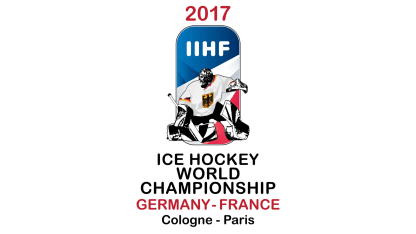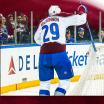The Colorado Avalanche will have nine players representing their respective home countries at the 2017 IIHF World Championship, which begins with the preliminary round on Friday, May 5, and concludes with the gold medal game on Sunday, May 21.
This year's tournament will be held in the host cities of Cologne, Germany, and Paris, France. Both sites will host preliminary play and quarterfinal games before Cologne takes over as the backdrop for the semifinals, bronze medal game and championship final.
Avalanche at the 2017 IIHF World Championship
Colorado will be well represented at the annual tournament

© IIHF
By
Ron Knabenbauer @RonKnab / ColoradoAvalanche.com
Avs players expected to play at the 2017 competition are Tyson Barrie, Matt Duchene, Nathan MacKinnon and Calvin Pickard of Canada, prospect Andrei Mironov of Russia, Gabriel Landeskog and Carl Soderberg of Sweden, Mikko Rantanen of Finland and J.T. Compher of the United States.
THE PLAYERS
Tyson Barrie (Canada): The Avalanche defenseman will be at his second World Championship after helping Canada win gold in 2015 in the Czech Republic. Barrie was also a member of the Canadians' silver medal-winning roster at the 2011 World Junior Championship.
J.T. Compher (United States): A member of Team USA's squad that just missed out on a medal last year, the Colorado rookie will return to wear the red, white and blue for the second-straight World Championship. A product of the U.S. National Team Development Program, the forward has also played for the United States at the 2012 and 2013 U18 World Championship and the 2015 World Junior Championship.
Matt Duchene (Canada): Never shy about representing his country, Matt Duchene will dress for Canada at his sixth World Championship. Having won gold the past two years at the tournament, Duchene's international trophy case also includes championships at the 2016 World Cup of Hockey, 2014 Winter Olympics, 2012 Spengler Cup and 2008 U18 World Championship. He will be an alternate captain for the team.
Gabriel Landeskog (Sweden): The Avalanche captain will be making his third appearance at the World Championship, and his first since he helped the Swedes win gold on home soil in 2013. Landeskog, who will be an alternate captain for this year's team, also helped his nation earn a silver medal at the 2014 Olympic Games. He was also a member of Team Sweden at 2016 World Cup of Hockey, 2012 World Championship, 2011 World Juniors and 2009 World under-18's.
Nathan MacKinnon (Canada): The Avalanche center will be dressing for his home country at his third World Championship. He helped Canada win gold in 2015 with nine points (four goals and five assists) in 10 games. The Cole Harbour, Nova Scotia, native made his Worlds debut in 2014 after appearing in six games at the World Junior Championship the previous year. MacKinnon, 21, played for the 23-and-under Team North America at last September's World Cup of Hockey.
Andrei Mironov (Russia): The Colorado prospect is on Russia's preliminary roster and has a good chance at competing in his second World Championship. The defenseman helped his country earn a silver medal at the 2015 Worlds. Selected No. 101 overall in the fourth round of the 2015 NHL Draft, Mironov has played the last five seasons with Dynamo Moscow in the Kontinental Hockey League.
Calvin Pickard (Canada): The Avs goalie will be looking for his second straight gold medal after helping the Canadians to the top of the podium last year. In two contests with Team Canada in 2016, he posted an impressive 0.50 goals-against average and .971 save percentage. It was his first IIHF experience since the U18's in 2010.
Mikko Rantanen (Finland): The Avalanche rookie forward will be going to his second straight World Championship after helping the Finns win a silver medal last year. The captain of the squad that won the 2016 World Junior Championship on home soil, Rantanen also competed for Finland at the 2014 U18 World Championship and 2015 World Juniors.
Carl Soderberg (Sweden): After appearing on Sweden's squad at last September's World Cup of Hockey, the Avs forward will once again wear the Tre Kronor on his sweater for his first World Championship. Prior to the World Cup, Soderberg's last major international tournament was the 2004 World Junior Championship.
WHAT TO WATCH FOR
Canada Going for Three-Peat
After failing to win gold for seven straight years, Team Canada is on its best run at the World Championship since the early 2000's when it last won back-to-back titles (2003-2004). The Canadians are looking to become the first team to win three consecutive gold medals at Worlds since the Czech Republic did it in 1999-2001.
The last time Canada won three straight was 1950-1952.
USA's Unprecedented Run
USA Hockey has had a strong start to the 2017 international season and will be looking to give the country its first World Championship gold since 1960 when the Olympics also doubled as the Worlds. The United States' only other World Championship gold was in 1933.
Team USA is on a roll to begin 2017, winning the IIHF's Men's World Junior Championship, under-18 Women's World Championship, Women's World Championship and under-18 Men's World Championship. According to USA Hockey, no other nation has ever won gold in the first four IIHF World Championships of a single season, until now.
The United States will look to make it five titles to begin the year and break that gold medal drought. It has been close with bronze medals in 2013 and 2015 and finishing fourth last year.
Rise of Finland
Finland continues develop skilled players that have jumped into the NHL at young ages, and that happens to coincide with its national team's consistent climb to the podium in recent years.
The Finns will be looking for their first World Championship gold since 2011 after earning silvers in two of the past three years. They also earned a medal at the last three Olympic Games, picking up a pair of bronzes in 2010 and 2014.
Avalanche rookie Mikko Rantanen will join this year's squad that also include young NHL stars in the making like Sebastian Aho (Carolina Hurricanes), Julius Honka (Dallas Stars) and Jesse Puljujarvi (Edmonton Oilers).
Russia Aiming for Another Medal
The Russians have earned a medal in each of the last three World Championships, and they'll be looking to add their fifth gold medal since 2008 and their 27th overall (includes Soviet Union's 22 World Championships) this year.
Russia last won gold in 2014 and 2012. Avalanche goaltender Semyon Varlamov backstopped the squad to victory in 2012.
The last time Team Russia won four straight medals was 2007-2010.
This Year's Surprise
The past several years at the tournament have included a surprise team(s) that has made it to the quarterfinals, preventing some of the top hockey nations from advancing. Switzerland made a Cinderella-type run in 2013 that ended with a silver medal.
Belarus slid into the quarters in 2014 and 2015, while France and Denmark advanced to the final eight in 2014 and 2016, respectively.
This year's Worlds has several teams that could get one of the top four spots from each pool. Keep an eye on Denmark and co-host Germany in Group A and Belarus, Norway and co-host France in Group B.
TOURNAMENT FORMAT
The 16 teams in the tournament are split into two groups for the preliminary round. Every team in each group will play one another, with the top four teams advancing to the quarterfinals. The squads will be ranked by points, with three points given for a regulation win and two points given for an overtime or shootout win. If a team loses in overtime or a shootout, it gets one point. No points are given for a regulation loss.
There will be crossover between the two groups during the quarterfinals. The top team from one group will play the fourth-ranked squad of the other, while the second-place club of the group will face the No. 3 team of the other pool (1A-4B, 2A-3B, 1B-4A, 2B-3A).
Teams
Group A (Cologne): Russia, United States, Sweden, Slovakia, Germany, Latvia, Denmark, Italy
Group B (Paris): Canada, Finland, Czech Republic, Switzerland, Belarus, Norway, France, Slovenia
Overtime & Shootouts
Like the NHL, overtime will consist of five minutes of 3-on-3 play before reverting to a best-of-three shootout if a winner hasn't been decided. During the quarterfinals, semifinals and bronze medal game, there will be a 4-on-4, sudden-victory overtime period for 10 minutes. In the gold medal game, overtime will consist of a 20-minute period of 5-on-5 hockey. If no goal is scored, the winner will be decided by a best-of-three shootout during the preliminary round and a best-of-five shootout during the playoffs. The same player can be used for each shot in the shootout, if desired.
Relegation
The participating teams in the tournament do not always stay the same. The two bottom ranked teams at the end of the tournament will be relegated to the 2018 IIHF World Championship Division I Group A, while the top two teams from Division I Group A will be promoted to take part in the 2018 World Championship. Denmark cannot be relegated as it is hosting next year's tournament.
Slovenia and Italy were promoted to take part in the 2017 Worlds while Hungary and Kazakhstan were relegated after finishing in the bottom two of the 2016 World Championship.
Rules
On-ice games will be governed by IIHF rules, which are very similar to the ones instituted in the NHL.
Contests will be played on international-sized ice surfaces, which are 15 feet wider than those found in all of NHL and most rinks in North America.
A full list of rules can be found at
HERE
.
DETAILS
Rinks
LANXESS Arena, Cologne, Germany: The home arena of Kolner Haie of the German hockey league opened in 1998 and seats 18,500. It was one of three venues used for the 2010 World Championship in Germany. The arena has also been used for team handball, basketball and concerts. It hosted the 2007 World Men's Handball Championship and was the site of UFC 99 in 2009.
AccorHotels Arena, Paris, France: Opening in 1984, the 14,500-seat arena has hosted plenty of prestigious events in its three-plus decades. From the annual Paris Masters ATP Tour tennis tournament to boxing to track cycling to European championships in gymnastics and basketball, the multi-purpose venue is one of the busiest in Western Europe.
Time Change
Cologne and Paris are in the Central European Time Zone, which is eight hours ahead of U.S. Mountain Daylight Time. Games in Europe are set to be played at either 12:15 p.m., 4:15 p.m. or 8:15 p.m. local time, which translates to start times of 4:15 a.m., 8:15 a.m., and 12:15 p.m. in Colorado and the Rocky Mountain region.
Broadcasts
All of Team USA's games will be televised live on NHL Network or on NBCSN and streamed via the NBC Sports app. Other select tournament contests will be broadcasted on NHL Network. The playoff rounds will also be televised.
Team Canada's games, as well as additional tournament matchups, will be televised in Canada on the networks of TSN.


















